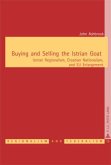Roy Jenkins brought great talent to Europe's top job. He played a key role in re-launching European monetary integration, winning the right to attend the new global summits, and smoothing Greece's path to EC membership. But he fell short of other targets. Commission reform remained elusive, as did an improvement of the UK's troubled relationship with the EC. Indeed the row over Britain's contribution to the EC budget, meant that Britain's position in Europe was as difficult when he left Brussels as it had been when he arrived. This study will look at how Jenkins approached his role, identifying his priorities, examining his working methods, and exploring his rapport with the European and international statesmen with whom he had to work. In the process, the book will shed light on the nature of the job, on Jenkins' own talents and limitations, and on the European Community as it struggled with the global economic crisis of the 1970s.
"Any reader already familiar with Ludlow's work would have high expectations for the book, and it does not disappoint. It is, of course, timely in the context of Brexit. ... Ludlow highlights the definite pattern of awkwardness in Britain's relations with Europe and that self-harming tendency to overestimate hugely British capacity to influence and to underestimate the capacity of her European partners to move right along without the UK." (Denise Dunne, English Historical Review HER, Vol. 133 (564), October, 2018)








